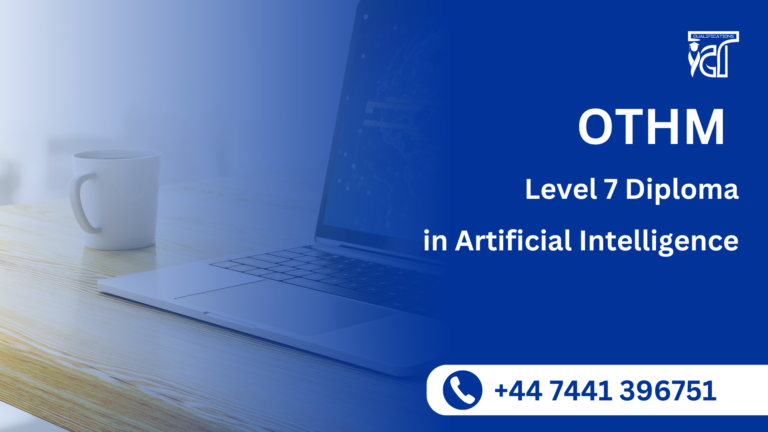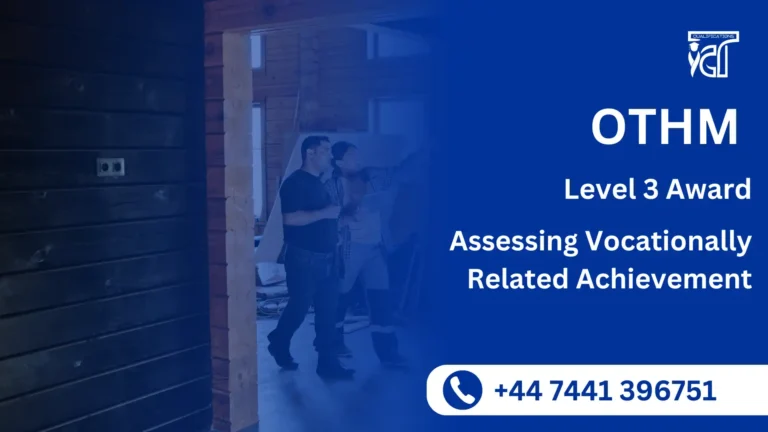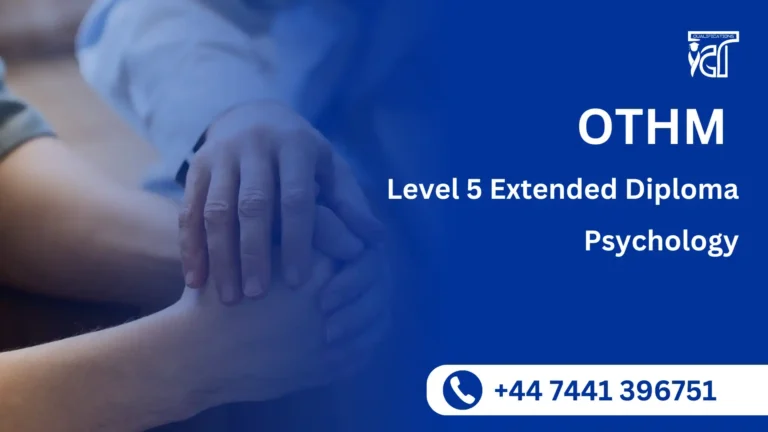In today’s competitive business world, standing out requires more than just experience. To excel in senior leadership roles and enhance your professional skills, having a recognized qualification can make all the difference. The OTHM Level 6 Diploma in Business Management is a prestigious, OFQUAL-regulated qualification designed to equip you with the advanced knowledge and skills needed to succeed in the dynamic field of business management.
The OTHM Level 6 Diploma in Business Management is a higher education qualification regulated by the Office of Qualifications and Examinations Regulation (OFQUAL), ensuring that it meets the highest academic and professional standards. This qualification is ideal for those who want to deepen their business acumen, enhance their leadership skills, and progress to managerial and senior management roles in various industries.
Designed with both theoretical and practical learning in mind, the diploma is entirely assignment-based, meaning there are no traditional exams. This allows you to demonstrate your learning through real-world business scenarios, making it a practical and effective way to gain in-depth knowledge while developing your critical thinking and problem-solving skills.
The OTHM Level 6 Diploma in Business Management offers an exceptional opportunity for aspiring and current business professionals to enhance their skills and gain a qualification that will open doors to new career opportunities. Whether you’re aiming for a higher management role, planning to advance your education, or developing your entrepreneurial ventures, this OFQUAL-regulated qualification equips you with the knowledge and expertise to succeed in the competitive business world.
OTHM Level 6 Diploma in Business Management
The OTHM Level 6 Diploma in Business Management is made up of 6 mandatory units, totaling 120 credits. The qualification requires 1200 hours of Total Qualification Time (TQT) and 480 Guided Learning Hours (GLH) to complete.
| Sr# | Unit Title | Credits | GLH |
|---|---|---|---|
| 1 | Leadership and People Management | 20 | 80 |
| 2 | Business Research Project | 20 | 80 |
| 3 | Operations Management | 20 | 80 |
| 4 | Financial Decision Making | 20 | 80 |
| 5 | Sustainable Business Practices | 20 | 80 |
| 6 | Strategic Human Resource Management | 20 | 80 |
GLH (Guided Learning Hours) and TQT (Total Qualification Time) are terms commonly used in vocational qualifications to help define the amount of time a learner is expected to spend on heir studies.
1. GLH (Guided Learning Hours)
GLH refers to the number of hours a learner spends being directly taught, supervised, or supported during their course. This includes the time spent in activities such as:
- Classroom instruction
- Practical workshops
- One-on-one tutoring or mentoring sessions
- Online learning sessions with tutor support
In other words, GLH represents the time that learners are actively engaged with their instructors or learning activities.
2. TQT (Total Qualification Time)
TQT represents the total amount of time a learner is expected to invest in completing a qualification, including:
- GLH (Guided Learning Hours): Time spent on direct learning, as explained above.
- Self-Directed Learning: This includes time spent on independent study, research, assignment completion, preparation for exams, and any other work the learner does outside of direct teaching hours.
TQT is a broader measure that includes all the time required to achieve the qualification. It helps learners and employers understand the overall commitment required for the qualification.
Key Differences Between GLH and TQT:
- GLH focuses on direct learning with guidance or supervision.
- TQT includes GLH as well as independent study time and other learning-related activities.
Example:
If a qualification has a TQT of 600 hours and a GLH of 250 hours, it means the learner should spend 250 hours in direct learning (classroom, online, or tutor-led sessions) and 350 hours on independent study or research.
Learning Outcomes of OTHM Level 6 Diploma in Business Management
Leadership and People Management
- Understand theories of leadership and people management.
- Be able to assess ways to improve motivation and performance by applying leadership skills.
- Be able to plan and carry out assessment of individual work performance and development.
- Be able to analyse team dynamics and its importance in achieving organisational goals.
Business Research Project
- Be able to propose a research project in a business and management context.
- Be able to prepare a research plan and conduct a literature review
- Be able to carry out research according to the chosen research specification.
- Be able to evaluate research and present results and conclusion.
Operations Management
- Understand the nature and importance of operations management.
- Be able to evaluate the link between operations management and strategic planning
- Be able to assess how to organise a typical production process
- Be able to apply relevant techniques to the production of an operational plan for an organisation.
Financial Decision Making
- Understand the role of financial information and financial analysis in business risk assessment and decisionmaking.
- Understand how financial statements and their structure aid business decision making.
- Be able to perform effective capital expenditure appraisal using range of techniques.
- Be able to evaluate how different ownership structures impact on financial performance.
Sustainable Business Practices
- Understand the global sustainability agenda.
- Understand the concept of the sustainable business organisation.
- Be able to review sustainable strategic business planning.
Strategic Human Resource Management
- Understand the role and importance of human resource management in achieving organisational effectiveness.
- Understand the formulation and implementation of human resource strategies.
- Be able to critically analyse the use and application of a range of HR strategies designed to improve employee and organisational performance.
- Be able to critically evaluate various key perspectives within Strategic Human Resource Management.
The Course Benefits of the OTHM Level 6 Diploma in Business Management are as :
- Industry Recognition
The OTHM Level 6 Diploma in Business Management is an OFQUAL-regulated qualification, ensuring it meets high academic and professional standards. It is recognized by employers and educational institutions globally, giving you a competitive edge in your career. - Practical Learning Approach
The course is entirely assignment-based, allowing you to apply your learning to real-world business scenarios. This practical approach helps you develop critical thinking, problem-solving, and decision-making skills essential for success in business management. - Flexible Study Options
The diploma offers flexibility for working professionals. With no exams and an assignment-based assessment structure, you can study at your own pace, balancing your work and personal commitments while progressing in your career. - Pathway to Higher Education
This qualification opens doors to further study. It can be used as a pathway to Master’s or MBA programs at leading universities, allowing you to continue your education without having to repeat basic concepts. - Enhanced Career Prospects
With a comprehensive curriculum covering strategic management, financial management, marketing, human resources, and more, you’ll be well-equipped for senior management and leadership roles. The diploma enhances your employability and prepares you for a wide range of business positions. - Develop Leadership Skills
The course is designed to equip you with the knowledge and skills needed to lead teams, manage change, and make informed business decisions. It focuses on strategic thinking, helping you develop the leadership skills needed to excel in high-level business roles. - Global Perspective
The qualification covers business concepts applicable globally, making it ideal for professionals looking to work in international business or multinational organizations. It provides a broader understanding of global business operations and practices. - Gain Specialized Knowledge
The diploma covers key areas such as business strategy, human resource management, financial management, marketing, and operations, providing you with a well-rounded skill set and a deeper understanding of business management. - Boost Entrepreneurial Skills
If you are an entrepreneur or aspiring business owner, this qualification provides the tools and insights needed to run and grow a successful business. It offers practical strategies to navigate the challenges of entrepreneurship and drive business success. - Improve Job Security
The OTHM Level 6 Diploma enhances your qualifications, making you a more attractive candidate for higher-level positions. This can lead to job promotions, salary increases, and greater career stability. - Networking Opportunities
Studying the diploma gives you access to a network of professionals, educators, and industry experts. These connections can be invaluable for your career growth, offering opportunities for collaboration, mentorship, and industry insights.
In summary, the OTHM Level 6 Diploma in Business Management is a valuable qualification that offers flexibility, practical learning, and global recognition, making it an ideal choice for anyone looking to advance their career in business management.
The OTHM Level 6 Diploma in Business Management is designed for individuals who aspire to advance their knowledge and skills in business management. Below are the key characteristics of the ideal learner for this course:
1. Educational Background
- Prior Qualifications: The ideal learner should have completed a Level 5 qualification in Business, Management, or a related field, or possess an equivalent academic qualification.
- Strong Foundation in Business: Learners should have a solid understanding of basic business concepts, which will be built upon in this advanced qualification.
2. Professional Experience
- Early-Career Professionals: The course is ideal for individuals who are currently working in business, management, or leadership roles and wish to progress to more senior positions.
- Business Administrators: Learners with experience in business administration, project management, or operations management will benefit from the advanced knowledge and practical skills offered by the diploma.
- Entrepreneurs: Individuals seeking to enhance their entrepreneurial abilities and gain strategic management skills for running their own business.
3. Career Aspirations
- Aiming for Leadership Roles: The ideal learner is someone looking to move into senior management or leadership positions, such as a Business Manager, Operations Manager, or Director.
- Career Development: Learners who want to formalize their business management knowledge and skills to boost their employability and career prospects.
- Aspiring Business Consultants: Individuals planning to transition into consultancy or advisory roles within organizations to improve business performance.
4. Skills and Competencies
- Leadership and Strategic Thinking: The ideal learner should have the desire to develop strong leadership qualities, with a focus on making strategic business decisions.
- Problem-Solving and Analytical Thinking: Learners should possess or be willing to develop strong analytical skills to evaluate business challenges and implement effective solutions.
- Communication Skills: Effective communication, both written and verbal, is essential, as learners will be required to express their ideas and solutions clearly in assignments.
- Time Management: As the course involves independent study and assignments, the ideal learner should be able to manage their time effectively to balance learning with personal and professional responsibilities.
5. Motivation and Personal Attributes
- Ambition and Drive: The ideal learner is highly motivated, goal-oriented, and committed to advancing their career in business management.
- Self-Discipline: Since the qualification is entirely assignment-based, the ideal learner should be self-driven and able to work independently, demonstrating strong organizational and time-management skills.
- Adaptability: The course is ideal for learners who can adapt to changing business environments and are open to learning new concepts and practices.
6. English Language Competency
- Proficiency in English: The ideal learner should have a strong command of the English language, as the course involves extensive reading, writing assignments, and research. Non-native English speakers may need to demonstrate their proficiency through tests like IELTS or equivalent.
7. Personal and Professional Growth
- Desire for Career Progression: The ideal learner should view the diploma as an opportunity to enhance their professional qualifications and move to the next stage in their career.
- Interest in Global Business: The course is suitable for learners interested in understanding global business practices, especially if they plan to work in multinational organizations or pursue international business opportunities.
In summary, the ideal learner for the OTHM Level 6 Diploma in Business Management is a professional or aspiring manager with a background in business, an interest in developing leadership skills, and the ambition to take on senior management roles. They should be motivated, self-disciplined, and eager to build a solid foundation for long-term career growth in business management.
Entry Requirements
Register Now
Qualification Process
Qualification Process OTHM Level 6 Diploma in Business Management
- Self-Assessment:
Begin by evaluating your eligibility to ensure you meet the qualification requirements, including work experience, knowledge, and language proficiency. - Registration:
Complete your registration by submitting the required documents, including a scanned copy of a valid ID, and paying the registration fee. - Induction:
An assessor will conduct an induction to confirm your eligibility for the course and explain the evidence requirements. If you do not meet the criteria, your registration will be canceled, and the fee will be refunded. - Assignments & Evidence Submission:
Provide all assignments and the necessary evidence based on the assessment criteria outlined in the course. If you are unsure of the required evidence, consult with the assessor for guidance on the type and nature of evidence needed. - Feedback and Revision:
The assessor will review your submitted evidence and provide feedback. Evidence that meets the criteria will be marked as “Criteria Met,” while any gaps will be identified. You will be asked to revise and resubmit if needed. - Competence Evidence:
Submit final evidence demonstrating that all learning outcomes have been met. This evidence will be marked as “Criteria Met” by the assessor once it is satisfactory. - Internal Quality Assurance (IQA):
The Internal Quality Assurance Verifier (IQA) will review your evidence to ensure consistency, quality, and compliance with standards. - External Verification:
The IQA will submit your portfolio to OTHM External Quality Assurance Versifier (EQA) for final confirmation. The EQA may contact you directly to verify the authenticity of your evidence. - Certification:
Upon successful completion of all checks, OTHM will issue your official certificate, confirming that you have attained the OTHM Level 6 Diploma in Business Management







